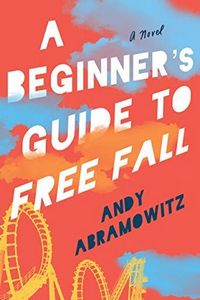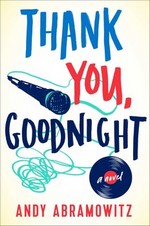 |
A Beginner’s Guide to Free FallKindle Edition, 396 pg. Read: August 9-11, 2021 |

The Opening
Four months from now, on a secluded beach in Turkey, Davis Winger, who came thousands of miles to start over, will drop his towel and paperback on the sand, wade into the sea, and end up under the tire of a Hyundai that has just come screeching over an embankment. He will be trapped under that car, pinned to the seabed with one final breath crowding his lungs. Time enough to lament that his daughter might now grow up without him; that he might never hear words of forgiveness from the woman he adored, and betrayed; that he might not live to build the roller coaster that his six-year-old had dreamed up from a storybook and that he had spent the summer engineering into reality. Constructing that ride, harnessing his daughter’s giddy vision into a set of blueprints, was his best shot at winning back the people he loved and hurt and lost. The promise of redemption was slipping away. All alone and far from home, he’ll reach for the surface as the sea encloses.
That autumn day was coming. But today it was still spring, a mild Saturday in May, and when Davis awakened next to his wife in the charmingly overgrown Baltimore neighborhood of Mount Washington, he was still gainfully employed and still welcome in his own home.
With an opening like that, how do you follow it up? No really, how do you? How do you get your readers to care about your protagonist and what he’s going through when you know this is what he’s headed for?
Well, enough of that…let’s get on with the post.
What’s A Beginner’s Guide to Free Fall About?
Davis Wagner has one of those jobs that you have a hard time believing people actually have, but clearly, someone does. He designs amusement park rides, like roller coasters. Which is cool enough—but he’s witty, friendly, compassionate, has a great daughter, a wonderful wife, and so on. He’s close with his sister, his father, and his father’s…partner, I guess. (she’s lived with him for years, so girlfriend doesn’t seem to fit…)—Davis’s mother ran off with her therapist when he and Molly were young, leaving them to be raised by their father.
But we know from the opening paragraph above, that this charmed life doesn’t stay charmed—after introducing the reader to this family, Abramowitz starts dismantling Davis’s life—after an accident (that Davis bears no responsibility for), his career is on the line; after something that Davis bears all the responsibility for, his marriage is in shambles and doesn’t look like it’ll recover. The only thing that Davis has left is his relationship with his young daughter in the summer before her first-grade year.
In the (apparently) four months he has left on Earth, can Davis build on the foundation of his relationship with his daughter to save his marriage and career?
There are other plotlines, sure, but this is the focus of the book and the weakness of it drags down the rest.
Molly Winger— Not Pictured
The high school yearbook was basically Davis’s personal photo album, but when Molly graduated three years later, below her photo it read: “Molly Winger—Not Pictured.” And the thing is, she was pictured. Her photo was right there, above the words “Not Pictured.” That was the essence of Molly. Seen yet somehow undetected. There but unaccounted for. Actually, she preferred it that way.
I just loved that idea—well, I mean, it’s depressing as all get out when you think about what that says about Molly—but it’s a great image.
Molly’s still pretty undetected. She writes for an independent newspaper—one limping along financially—as if there weren’t another kind—primarily writing features, but really doing whatever she has to help keep it afloat. She’s dating someone years younger than her, and in no way right for her (or she for him)—she’s smart, literate, cultured. He’s in his mid-twenties, and when he’s not working, he’s playing video games or watching horror movies with his “boys.”
While her brother is trying to put his life back together, Molly stumbles upon a series of articles that will help her confront her own demons, help her readers, and maybe get her detected by people.
I’m glad I read this book if only for the Molly storyline/storylines—Abramowitz was at his strongest here. A character you can sympathize with, chuckle at, and hope for.
Sibling Rivalry
At some point years before we meet them, Davis and Molly started playing this game—Davis would call her out of the blue, and they’d pitch horrible ideas for businesses to each other. For example, a store that sells concert T-shirts for bands that you wouldn’t want to wear in public—Hanson, Sheena Easton, Julian Lennon, Spin Doctors, and so on.
It’s one of those things that makes the most sense in terms of siblings—a running joke that they may not be able to remember the origins of, but it’s something they’ll always do. When you stop and think about it, it’s really sweet.
If you don’t stop and think that much and just read the ideas? They’re hilarious.
Tom Petty
Similarly, Davis amuses himself by working Tom Petty song titles into his conversation around or about one character. It’s a strange way of showing affection, but it works. Sure, I think it’d get annoying in real life—but it’s exactly my kind of humor.
So, what did I think about A Beginner’s Guide to Free Fall?
It took me a long time to be able to care about Davis and his woes, much less his attempts at rehabilitation. I just couldn’t shake the opening paragraph. But I eventually came around and appreciated that part of the novel (which is good, because it’s the majority).
Still, I’d have probably DNFed this if Molly wasn’t around—the character and what she does in the novel are its saving graces.
Abramowitz can write a sentence—I really enjoyed the voice, the way he told the story (well, after the opening), and the themes he explored. I laughed and was moved, and thought a little about life. A Beginner’s Guide to Free Fall is worth the time and effort, you’ll enjoy it.

This post contains an affiliate link. If you purchase from it, I will get a small commission at no additional cost to you. As always, opinions are my own.
![]()





